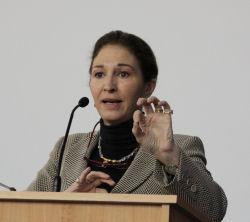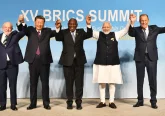 On May 18, 2011 Professor Anne-Marie Slaughter delivered the inaugural Distinguished Fulbright Lecture in Oxford. The topic: The Turn: US Foreign Policy from 2009 to 2011. The key message I took away from the lecture was that during the Obama Presidency, US diplomatic missions have shifted their focus more towards societal actors. The nature of US diplomacy has expanded from acting almost exclusively on a government to government basis, to interacting with societal actors or even acting as a facilitator between societal actors in different countries.
On May 18, 2011 Professor Anne-Marie Slaughter delivered the inaugural Distinguished Fulbright Lecture in Oxford. The topic: The Turn: US Foreign Policy from 2009 to 2011. The key message I took away from the lecture was that during the Obama Presidency, US diplomatic missions have shifted their focus more towards societal actors. The nature of US diplomacy has expanded from acting almost exclusively on a government to government basis, to interacting with societal actors or even acting as a facilitator between societal actors in different countries.
This change in diplomacy is part of the emergence of a new paradigm driving the US Foreign Policy post “9/11”. In this paradigm, separation gives way to interconnectedness, conflict to collaboration; and the sole consideration of governments to engagement with divergent non-government actors. The paradigm of the Cuban Missile Crisis era, which Professor Slaughter so eloquently described in her talk, however, is still dominant in international relations. State actors are still prioritised over non-state actors. The two paradigms, one focused solely on state actors, the other engaging with networked society, are complimentary, and coexist in today’s world. As a result, we are seeing new theoretical frameworks, such as complexity and network theories to address the emerging issues of our increasingly multi-dimensional world.
In practice, the increasing consideration of society in foreign policy formation translates into a rising emphasis on development in US diplomatic missions’ agenda. Professor Slaughter spoke of specific programs being implemented to address societal issues. These include the empowerment of women and youth in developing countries. She also spoke of ‘society-to-society’ diplomatic missions facilitated by the government. These missions allow for the private sector to engage in international development initiatives. Mobilisation of actors outside the government is key to the success of its diplomatic initiatives.
In the Q&A session, Professor Slaughter touched upon the importance of international organisations, as they can be better equipped to address certain societal issues than governments. Some multilateral organisations, like NATO, however, have to rethink their missions to incorporate social dimensions in addition to military ones. A more comprehensive approach is already at the core of NATO’s new strategic concept, including building institutions in fragile countries.
Slaughter also mentions the importance of international collaboration on all of these issues. Working with other countries is key, and she does not advocate a US-centric approach.
When asked whether this turn is permanent or could be reversed in the next presidential election, or as a result of a different partnership within Congress, Slaughter argues that this shift is unlikely to be reversed, and that its roots predate the Obama Administration. Even under George W Bush, development was already increasingly prioritised, with foreign assistance doubling during his time in office.
There is certainly much room for testing these new diplomatic initiatives in the emerging democracies of North Africa. How these societies will be rebuilt, and what role the United States and the international community will play in the process will be fascinating to follow. It is also evident that there will be an increased interaction, on both practical and theoretical levels, between the fields of international relations and development, especially in the context of the United States. Understanding these linkages will be important to future scholars of Politics and International Relations.
A recording of the lecture can be heard here: Podcast recording of Professor Anne-Marie Slaughter\’s Fulbright Lecture (18 May 2011)
Photo courtesy of Alessandro Iandolo, alessandro.iandolo@sant.ox.ac.uk, released under CC-BY-SA licence.









No Comment